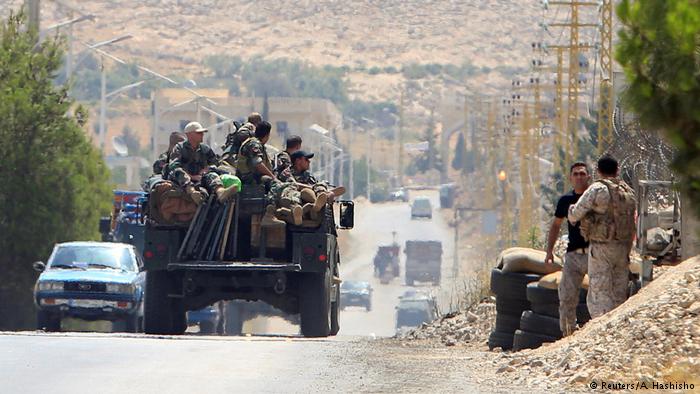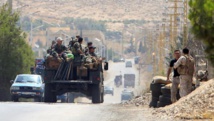Addressing the families of the soldiers who were gathering in downtown Beirut, Ibrahim said that the army are "almost certain” that the bodies belong to the missing soldiers.
"In my name, and in the name of the army commander, I salute the families of the troops for their resilience and patience. They should be proud of their sons," Ibrahim said.
Hassan Youssef, father of one of the nine soldiers, almost fainted as he listened to Abbas.
"I want to die too," said Youssef as he was being pulled away by his relatives.
By nightfall, ambulances carrying the eight bodies had reached the eastern Lebanese town of Labweh and headed to the military hospital in the Lebanese capital, according to a Lebanese army source.
Intelligence from Islamic State fighters who had surrendered to the Lebanese army had led them to the remains of the dead soldiers, the source said, adding that the soldiers were killed in February 2015.
The bodies were found in the area of Wadi al-Deb, at the outskirts of the Lebanese town of Arsal, the source added.
The source said a ninth missing soldier is believed to have defected and joined the ranks of Islamic State.
The soldiers have been missing since August 2014.
Lebanon announced on Sunday morning that the army was halting its fight against Islamic State, the Lebanese state-run news agency reported.
The ceasefire, which took effect at 7 am (0400 GMT) according to an army statement, was intended to give a chance for final negotiations over the fate of soldiers, who had been presumed abducted.
The nine soldiers went missing in the aftermath of a clash with Islamic State militants in the Arsal area near the Syrian border in 2014.
Sixteen other soldiers missing since the 2014 clashes were released last year after mediated negotiations with the jihadists.
The Lebanese Shiite movement Hezbollah said on Sunday, through its broadcaster Manar TV, that it had struck a deal with Islamic State fighters, under which the latter will hand over the bodies of five Hezbollah fighters.
The nine abducted Lebanese soldiers were reportedly involved in the deal.
In return, the militants would reportedly be allowed to leave Lebanon and go to eastern Syria.
The Syrian government army announced that it had approved the deal "between Hezbollah and the terrorist organization of Daesh, which entails militants evacuating [Lebanon] to the eastern part of Syria."
"The deal is to spare the blood of our forces and that of our allies," the army statement added, as cited by the Syrian state-run news agency.
Sunday's ceasefire is also effective in Syria's Western Qalamoun area.
A Lebanese security source said that around 400 militants and their families are expected to be evacuated in the coming days towards Deir al-Zour in eastern Syria, which is mostly controlled by the Islamic State.
On August 19, the Lebanese armed forces launched an offensive aimed at driving the militants out of the eastern desert areas of Ras Baalbek and Qaa.
Earlier this month, more than 1,000 from the al-Qaeda linked Fatah al-Sham as well as civilians left the mountainous area of Arsal near the Syrian border and returned to the north-western province of Idlib.
Hezbollah has been fighting alongside Syrian President Bashar al-Assad since 2012.
In mid-August, around 300 Syrian rebel fighters left the outskirts of Arsal in north-eastern Lebanon to return to Syria.
The rebel fighters headed to al-Rouhiba, a rebel-held town 50 kilometres north-east of Damascus in Syria's eastern Qalamoun region, which was the scene of bloody fighting between the Syrian army and Hezbollah on one side and Islamic State on the other.
Syria's civil war, now in its seventh year, has devastated the country, claimed hundreds of thousands of lives and displaced about half of the pre-war population of 22 million.
---------------------------------------------------------------------------------------------------------------------------
"In my name, and in the name of the army commander, I salute the families of the troops for their resilience and patience. They should be proud of their sons," Ibrahim said.
Hassan Youssef, father of one of the nine soldiers, almost fainted as he listened to Abbas.
"I want to die too," said Youssef as he was being pulled away by his relatives.
By nightfall, ambulances carrying the eight bodies had reached the eastern Lebanese town of Labweh and headed to the military hospital in the Lebanese capital, according to a Lebanese army source.
Intelligence from Islamic State fighters who had surrendered to the Lebanese army had led them to the remains of the dead soldiers, the source said, adding that the soldiers were killed in February 2015.
The bodies were found in the area of Wadi al-Deb, at the outskirts of the Lebanese town of Arsal, the source added.
The source said a ninth missing soldier is believed to have defected and joined the ranks of Islamic State.
The soldiers have been missing since August 2014.
Lebanon announced on Sunday morning that the army was halting its fight against Islamic State, the Lebanese state-run news agency reported.
The ceasefire, which took effect at 7 am (0400 GMT) according to an army statement, was intended to give a chance for final negotiations over the fate of soldiers, who had been presumed abducted.
The nine soldiers went missing in the aftermath of a clash with Islamic State militants in the Arsal area near the Syrian border in 2014.
Sixteen other soldiers missing since the 2014 clashes were released last year after mediated negotiations with the jihadists.
The Lebanese Shiite movement Hezbollah said on Sunday, through its broadcaster Manar TV, that it had struck a deal with Islamic State fighters, under which the latter will hand over the bodies of five Hezbollah fighters.
The nine abducted Lebanese soldiers were reportedly involved in the deal.
In return, the militants would reportedly be allowed to leave Lebanon and go to eastern Syria.
The Syrian government army announced that it had approved the deal "between Hezbollah and the terrorist organization of Daesh, which entails militants evacuating [Lebanon] to the eastern part of Syria."
"The deal is to spare the blood of our forces and that of our allies," the army statement added, as cited by the Syrian state-run news agency.
Sunday's ceasefire is also effective in Syria's Western Qalamoun area.
A Lebanese security source said that around 400 militants and their families are expected to be evacuated in the coming days towards Deir al-Zour in eastern Syria, which is mostly controlled by the Islamic State.
On August 19, the Lebanese armed forces launched an offensive aimed at driving the militants out of the eastern desert areas of Ras Baalbek and Qaa.
Earlier this month, more than 1,000 from the al-Qaeda linked Fatah al-Sham as well as civilians left the mountainous area of Arsal near the Syrian border and returned to the north-western province of Idlib.
Hezbollah has been fighting alongside Syrian President Bashar al-Assad since 2012.
In mid-August, around 300 Syrian rebel fighters left the outskirts of Arsal in north-eastern Lebanon to return to Syria.
The rebel fighters headed to al-Rouhiba, a rebel-held town 50 kilometres north-east of Damascus in Syria's eastern Qalamoun region, which was the scene of bloody fighting between the Syrian army and Hezbollah on one side and Islamic State on the other.
Syria's civil war, now in its seventh year, has devastated the country, claimed hundreds of thousands of lives and displaced about half of the pre-war population of 22 million.
---------------------------------------------------------------------------------------------------------------------------









 Home
Home Politics
Politics











